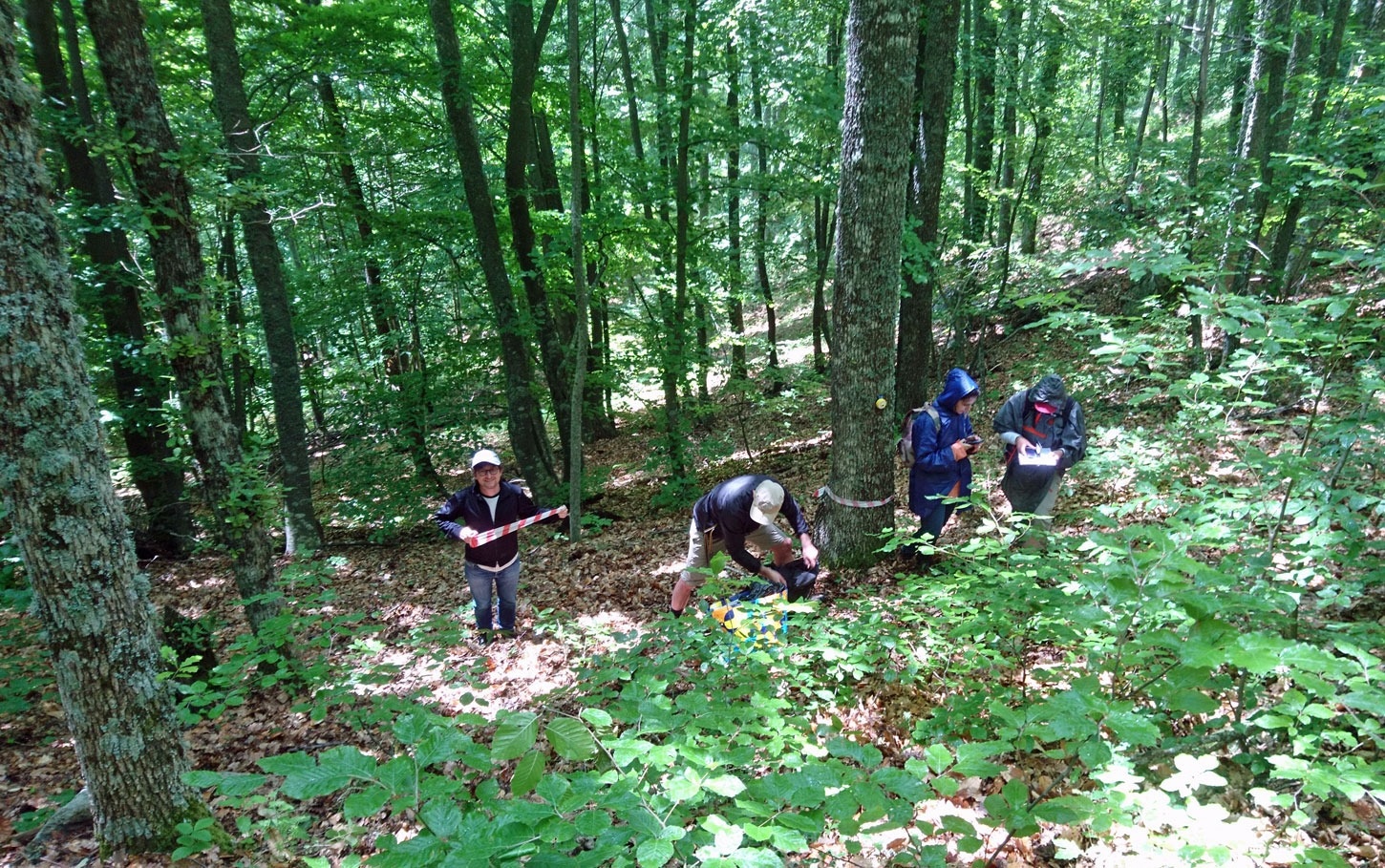Pedunculate, sessile and downy oaks are to be found throughout Europe, both on arid sites and on sites with a good water supply. The international ACORN research project is investigating the (genetic) adjustments shown by trees in dry sites in order to secure seed sources that can tolerate global warming for the oak forests of the future.

Sampling sessile oaks on a moist site in Chalkidiki, northern Greece. Image Credit: C. Neophytou
Here is a scene that we know well from police procedurals: when forensic experts put on gloves and twirl a white swab in a suspect’s mouth, they are out for a DNA sample to identify the person’s genetic profile. But how do you get the genetic fingerprint of an oak tree?
We need a leaf in the summer or a bud in the winter – the question is how we collect the material.”
Charalambos Neophytou, Forest geneticist
In 2021, teams of skilled experts roamed forests from the Austrian Kamptal to the Turkish province of Ankara in order to get samples from the tree canopy. Their equipment included six-meter pole saws and bags with tether ropes that are flung up into the tree crown and then used to shake the branches. An impressive 3,000 oak trees – pedunculate, sessile and downy oaks to be exact – throughout Europe were sampled for the ACORN project.
Neophytou directed teams from five countries who cooperated with many additional helpers. Neither wet feet nor steep slopes could deter them from systematically sampling trees in suitable stands in Central Europe and the Eastern Mediterranean in order to explore what adjustment mechanisms they had developed in dry sites. The outcome is expected to help identify native seed sources for future oak forests in the face of global warming.
Local Seeds for Climate-proof Oak Forests
Widely found in Europe, all three species (pedunculate, sessile and downy oak) are winning bets when it comes to climate change. The trees are able to adapt to a wide variety of site conditions. Principal investigator Neophytou, most recently a senior scientist at the Vienna University of Natural Resources and Applied Life Sciences (BOKU) and now in charge of the forest genetics unit at the Freiburg Forest Research Institute, has been investigating breeding issues for many years. “We assume that one can find adaptations to drought stress in the genotype, that is the tree’s genetic makeup, but also in the phenotype, which relates to all its observable characteristics. ACORN intends to identify these adaptation signatures. And if they are found, we will explore whether we can use them to strengthen the resilience of future oak forests by collecting seedlings from drought-adjusted sites.”
Seed Sources from the Kamp Valley to Ankara
The collection of data in the field, which took a lot of time and effort, has been completed. Now the genetic evaluations of species identity and adaptation, as well as cross-border planting trials, are under way, with results expected for fall 2023. The project team first combined the DNA of about 30 individuals each from one species and decoded the genome of the three species by means of next generation sequencing in order to identify those parts of the genome that carry the local adaptation signatures. In addition, stand pairs will be compared genetically: two tree stands of the same species in direct proximity that are only different in terms of water supply. Ten pairs per species in Central Europe and South East Europe. For instance, a pedunculate oak forest in the Kamp Valley next to the river and a stand on a nearby steep slope that cannot retain water well. Two downy oak stands in southern Turkey, one with good water supply, the other a dry site. The researchers extract the tree DNA and screen it for genetic differences that suggest higher drought resilience.
In addition, local “seeds,” i.e. acorns, were collected from individual mother trees in 24 stands and planted in trial plots. The physiological fitness of the seedlings (e.g. chlorophyll levels) has been analyzed regularly since January 2022, and the researchers monitor how well these offspring are faring. Will a seedling from the pedunculate oak at the steep slope in the Kamp valley survive well in Ankara? And will a southern German seedling from 1000 meters above sea level thrive in Vienna’s Pannonian climate? Answers to these questions will be available in 2024.
Transnational Forest Research
The researchers of the international ACORN consortium are receiving funding from the Austrian Science Fund FWF, from other national funding agencies and from EU funds (Horizon 2020). Under BOKU leadership, participating institutions include the Austrian Institute of Technology, the Swiss Federal Institute for Forest, Snow and Landscape Research, the Forest Research Institute of Baden-Württemberg (Germany), the Aristoteles University in Thessaloniki (Greece), the Middle East Technical University in Ankara as well as the National Botanical Garden of Turkey with the Agricultural Research and Policy General Directorate (TAGEM).
Together, they have developed a methodological approach and agreed on coordinated field work instructions to ensure comparability of data. This was followed by the identification of suitable tree populations for the issues concerned. In some instances, GIS satellite data helped with this task. But, as the principal investigator underlines, it also required the local know-how of experts, assistance from forest owners and transnational cooperation. Cross-border networks, helping hands and knowledge transfer, as they were found in the ACORN project, are prerequisites for the resolution of global challenges – and for the large-scale search for the DNA of oak trees that can survive drought stress.